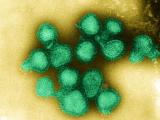Oct 19, 2010
H1N1 still a threat in some countries
Although health officials are anticipating that influenza A (H3N2) may play a greater role in the Northern Hemisphere's flu season, the 2009 H1N1 virus is still dominant and active in some parts of the world. Australia, in an update today, said some surveillance reports show that flu activity is increasing, while other systems show that circulation is declining. Activity is highest in South Australia state, and hospitalizations have increased slightly. About 67% of the respiratory specimens that tested positive for flu were the 2009 H1N1 strain. The country has experienced a late-season surge in flu infections. Meanwhile, health officials in Zimbabwe reported fresh outbreaks of 2009 H1N1 in all of the country's provinces, Afrik News reported on Oct 17. A remote southern district has reported 300 cases in school children. An epidemiologist with Zimbabwe's health ministry told Afrik News that the country's flu season typically runs from May through September and that she suspected that the H3N2 seasonal flu virus is circulating in the country, as well. Elsewhere, India reported another decline in 2009 H1N1 flu cases and deaths. The country's health ministry said cases declined in the week ending Oct 17 for the fifth week in a row.
Oct 19 Australian health ministry flu surveillance report
Oct 17 Afrik News story
Oct 18 Indian health ministry flu surveillance report
Indian company launches cell-based flu vaccine
Bharat Biotech, based in Hyderabad, India, yesterday announced the launch of the country's first cell-culture 2009 H1N1 vaccine. In a press release, the company said the vaccine marks the first cell-based vaccine to be made in a developing country. Indian drug regulators cleared the vaccine for marketing in early October. The single-dose vaccine is available through the private sector and government agencies. Dr Krishna Ella, Bharat's chairman and managing director, said in the press release that many people in India have not been vaccinated against the 2009 H1N1 virus yet. He added that the company expects demand for flu vaccines in India to rise, because consumers have become more aware of the disease.
Groups promote election-day flu clinics
Two national nonprofit groups have teamed up again to encourage flu vaccination at US polling locations on the Nov 2 election day. In a follow-up to its nationwide Vote & Vax Election Day initiative in 2008, the Robert Wood Johnson Foundation and the Sickness Prevention Achieved through Regional Collaboration (SPARC) are helping local health providers launch the election-day vaccination clinics at or near polling sites. Resources for setting up a successful clinic are available on the Vote & Vax Web site, along with background materials for election officials. In 2008 the program delivered 21,434 flu vaccinations at 331 polling places in 42 states and the District of Columbia.
Vote & Vax Web site



















